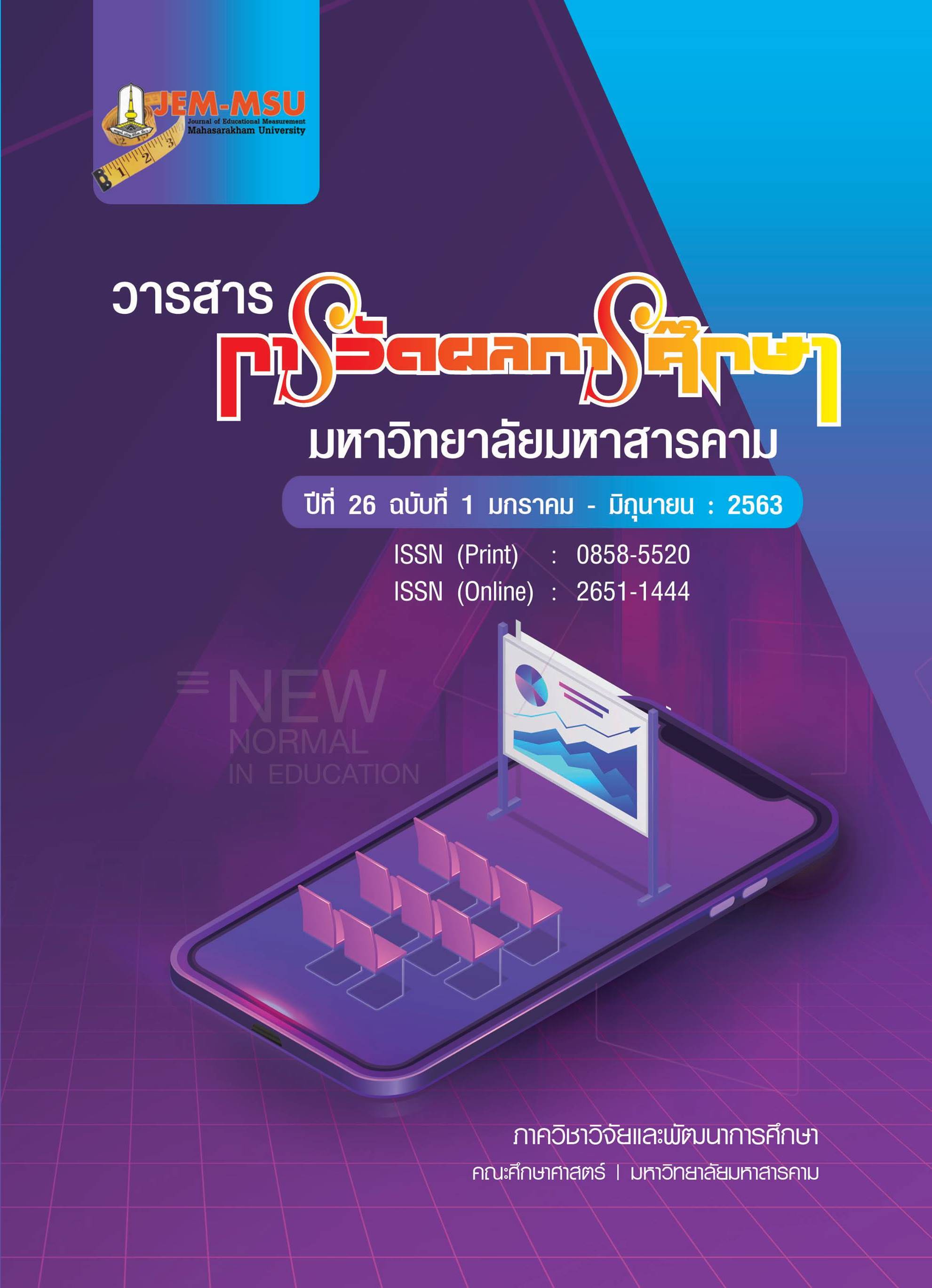A Study on Relationship between Participation in the Professional Learning Community and Perception of Teaching Efficacy and the Teacher’s Code of Ethics of Pre-Service Teachers
Main Article Content
Abstract
This research employed the survey method. It aimed to determine the relationship between participation in the professional learning community, perception of teaching efficacy and the teacher’s code of ethics according to the perceptions of pre-service teachers. Data were collected from 700 pre-service teachers during their practicum in schools. The Professional Learning Community scale, the Teaching Efficacy scale and the Teacher Ethics scale were used in collecting data. Descriptive statistics and Pearson moment-product correlation were employed to analyze the data. The research results indicated that high positive relationships existed between the professional learning community, the teaching efficacy and the teacher‘s code of ethics.
Article Details
The content and information contained in the published article in the Journal of Educational Measurement Mahasarakham University represent the opinions and responsibilities of the authors directly. The editorial board of the journal is not necessarily in agreement with or responsible for any of the content.
The articles, data, content, images, etc. that have been published in the Journal of Educational Measurement Mahasarakham University are copyrighted by the journal. If any individual or organization wishes to reproduce or perform any actions involving the entirety or any part of the content, they must obtain written permission from the Journal of Educational Measurement Mahasarakham University.
References
ชัยวุฒิ บรรณวัฒน์. (2552). ครู" มืออาชีพ...อาชีพ "ครู" คนละเรื่องเดียวกัน” http://www.moe.go.th /moe/th/news/detail.php?NewsID=8152&Key=hotnews
Prawit Erawan. (2016). A Comparison of Teaching Efficacy, Commitment to Teaching Profession and Satisfaction with Program Effectiveness of Teacher Students Under the 5 Year-Program Curriculum and Those Under the 4+1 Year-Program Curriculum. European Journal of Social Sciences – Volume 14, Number 2 (2010).
เรวณี ชัยเชารัตน์. (2560). สมรรถนะด้านการออกแบบการเรียนการสอนของนักศึกษาครูที่เข้าร่วมเป็นสมาชิกชุมชนการเรียนรู้ทางวิชาชีพ. วารสารครุศาสตร์ จุฬาลงกรณ์มหาวิทยาลัย, 45(4) (ตุลาคม-ธันวาคม 2560), 142-163.
เรวณี ชัยเชารัตน์. (2560). สมรรถนะด้านการออกแบบการเรียนการสอนของนักศึกษาครูที่เข้าร่วมเป็นสมาชิกชุมชนการเรียนรู้ทางวิชาชีพ. วารสารครุศาสตร์ จุฬาลงกรณ์มหาวิทยาลัย, 46(4) (ตุลาคม-ธันวาคม 2561), 318-338.
วรลักษณ์ ชูกำเนิด และเอกรินทร์ สังข์ทอง. (2557). โรงเรียนแห่งชุมชนการเรียนรู้ทางวิชาชีพครู เพื่อการพัฒนาวิชาชีพครูที่เน้นผู้เรียนเป็นหัวใจสำคัญ. วารสารวิทยบริการ มหาวิทยาลัยสงขลานครินทร์, 25(1), มกราคม-เมษายน.
วิจารณ์ พานิช. (2555). วิถีสร้างการเรียนรู้เพื่อศิษย์ ในศตวรรษที่ 21. กรุงเทพฯ : มูลนิธิสดศรี – สฤษดิ์วงศ์.
สำนักงานกองทุนสนับสนุนการสร้างเสริมสุขภาพ (สสส). (2546). นักสร้างเสริมสุขภาพต้องทำงานนอกกรอบของวงการสาธารณสุขแบบเดิม. (สืบค้น 8 เมษายน 2559) จาก http//www.thaihealth.or.th
สถาบันวิจัยเพื่อการพัฒนาประเทศไทย. (2557). รายงานฉบับสมบูรณ์ การจัดทำยุทธศาสตร์การปฏิรูปการศึกษาขั้นพื้นฐานให้เกิดความรับผิดชอบ. กรุงเทพฯ: สถาบันวิจัยเพื่อการพัฒนาประเทศไทย.
สกศ. (2558). รายงานผลการศึกษา: สถานภาพการผลิตและพัฒนาครูในประเทศไทย http://backoffice. onec.go.th/uploads/Book/1442-file.pdf)
Bandura, A. (1997). Self-Efficacy: The Exercise of Control. New York: W. H. Freeman.
Battersby, S. (2015). The Culture of Professional Learning Communities and Connections to Improve Teacher Efficacy and Support Student Learning. Arts education policy review, 116, 22–29.
DuFour, R. (2004). What is a “professional learning community” ? Educational Leadership. 61(8), 6–11.
Gavora, P. (2010). Slovak Pre-Service Teacher Self-Efficacy: Theoretical and Research Considerations. The New Educational Review, 21(2), 17-30.
Hord, S. M. (1997). Professional learning communities: What are they and why are they important? Southwest Educational Development Laboratory, 6(2), 1–8.
Hord, S. M. (2009). Professional learning communities: Educators work together toward a shared purpose improved student learning. National staff development council, 30(1), 40-43.
Kalkan, F. (2015). Relationship between Professional Learning Community, Bureaucratic Structure and Organizational Trust in Primary Education Schools. Educational Sciences: Theory & Practice. October, 16(5), 1619–1637.
Kitsantas, A. (2012). Teacher efficacy scale for classroom diversity (tescd): a validation study. Profesorado. 16(1).
Karma S. (2018). Importance of Professional Ethics for teachers. International Education & Research Journal [IERJ], 4(3), 16-18.
Maria Poulou, (2003). Influential Factors on Teaching Efficacy: Prospective Teachers’ Beliefs. Paper presented at the British Educational Research Association Annual Conference, Heriot-Watt University, Edinburgh, 11-13 September.
Sjoer, E and Meirink, J. (2016). Understanding the complexity of teacher interaction in a teacher professional learning community. European Journal of Teacher Education, 39(1), 110–125.
Tschannen-Moran, M., Hoy, A. and Hoy, W. K. (1998). Teacher Efficacy: Its Meaning and Measure. Review of Educational Research, 68, 202-248.


